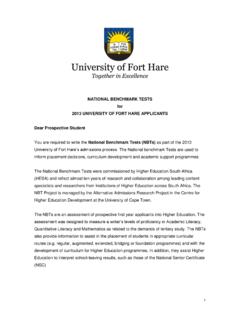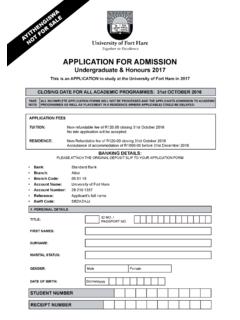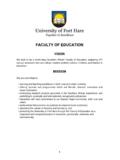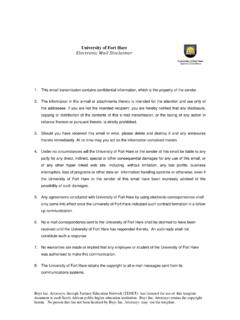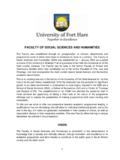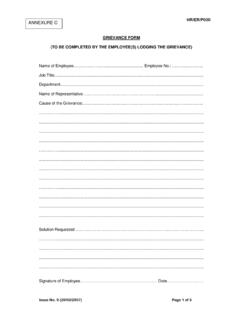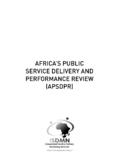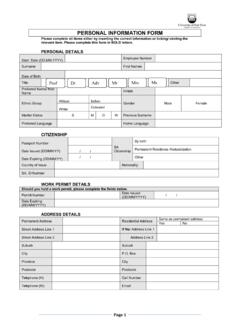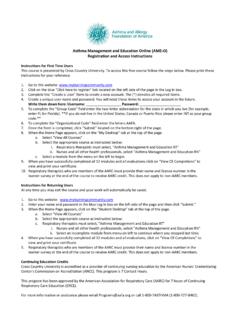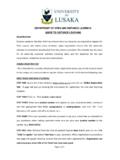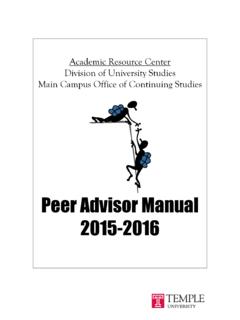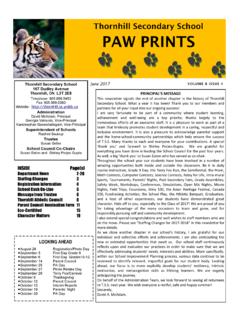Transcription of Frequently Asked Questions: Changes to DHET …
1 Released on 9 January 2018 1 Frequently Asked Questions: Changes to DHET funding for poor and working class students in public higher education institutions. The following Frequently Asked questions (FAQs) address the Changes to student funding resulting from the announcement by the President of South Africa, on 16 December 2017, that government would be phasing in fully subsidised free higher education and training for poor and working class South Africans over a five year period. This announcement has resulted in the establishment of the Department of Higher Education and Training (DHET) Bursary Scheme for poor and working class students to access studies at a public university.
2 The new DHET Bursary Scheme is one component of government s response to sustained engagement within the higher education sector on the costs of higher and post-school education and training in South Africa, and is part of government s response to the recommendations of the Heher Commission. The President s announcement has implications for the funding of both continuing NSFAS qualifying university students and new first time entrants (FTEN) in 2018. These implications are explained below in sections A and B respectively. Section C deals with the 8% DHET 2018 Fee Adjustment Grant. A: What does the President s statement mean for continuing university students ?
3 1. Will I receive a loan or a bursary in 2018 as a returning NSFAS qualifying student? In line with the President s statement, if you are a continuing student in 2018 and were funded by NSFAS in 2017 or earlier, your 2018 NSFAS allocation will now be awarded as a bursary. This NSFAS allocation will not have to be repaid. Released on 9 January 2018 2 2. I am a continuing student at a university and owe NSFAS the loan amount for the 2016 and 2017 academic years. Does the announcement of the President mean that my NSFAS debt will be converted to a bursary? You will be supported to register and continue your studies from 2018 onwards through bursary funding.
4 Your past loans will not be converted to a bursary at this time. The Minister of Higher Education and Training after undertaking due diligence and affordability studies in conjunction with the Department of Planning, Monitoring and Evaluation and the National Treasury to determine the quantum of funding required to address the debt owed by students to NSFAS and institutions. If you are a second year student studying towards a three-year qualification in 2018, funding for your second and third year will be in the form of a bursary and will not have to be repaid. 3. As a NSFAS qualifying returning student, do I have to pay a registration/upfront fee to the university?
5 You do not need to pay a registration/upfront fee. An arrangement has been made with universities to allow you to register. Your registration/upfront fee will be covered by your NSFAS package. 4. I am a continuing student at a university and have applied to NSFAS for the first time in 2018. Will I be considered for financial aid for the 2018 academic year even though I am not a first time entrant? Yes, you will be considered for financial aid funding, provided you meet the pre-2018 NSFAS s academic and financial eligibility requirements. As a continuing student your combined household income threshold will be assessed in terms of the 2017 NSFAS DHET general fund criteria ( up to R122 000 per annum).
6 5. I am a continuing student at a university and was not funded in prior years, as I did not qualify for NSFAS due to financial ineligibility. For 2018, my combined gross family income is between R122 000 and R350 000 per annum. Does this mean that I am now eligible for NSFAS? Continuing students who applied for NSFAS by the closing date of the 30 November 2017 will be considered for funding. The criteria that will be applied for returning students eligibility for funding will be in terms of the pre 2018 DHET General Fund criteria ( utilising the gross household income threshold of R122 000 per annum). Released on 9 January 2018 3 The reason for applying these criteria is that the new DHET Bursary Scheme is being phased in over a period of five years, starting with 2018 FTEN students .
7 6. I was funded by NSFAS in the past, but dropped out in 2016 due to not meeting the academic requirements. I returned to the university in 2017 and paid my own fees through financial assistance from other sources. I meet the academic requirements to continue in 2018. Will I be funded by NSFAS? Yes, your NSFAS funding will be reinstated based on meeting the academic requirements. This is in line with NSFAS rules. Your funding in 2018 will be a bursary and not a loan. 7. I come from a family with a gross annual household income below R122 000. I was registered in a previous academic year at a university and dropped out due to financial constraints.
8 Will I qualify for funding to return to university to complete my qualification? Yes, you will qualify to be funded, provided you meet the NSFAS academic progression criteria, have applied to NSFAS for funding before 30 November 2017, and come from a family with a gross annual income of up to R122 000. 8. I graduated in 2016 and have NSFAS debt. Will my NSFAS debt be written off or converted into a grant? Your situation will be dealt with as part of the process described in question 2. 9. I am a continuing NSFAS qualifying student in 2018 and have university debt. Can I apply to NSFAS for a grant to settle my university debt? Your university debt will be dealt with as part of the process described in question 2.
9 10. I am a continuing NSFAS qualifying student in 2018 with university debt. Will I be allowed to register? Yes, you can register provided that you have made appropriate arrangements with your university. You will not be required to pay a registration fee/upfront payment in 2018 in order to register. NSFAS will pay this on your behalf. Your university debt will be dealt with as part of the process described in question 2. Released on 9 January 2018 4 B: What does the President s statement mean for first time entry (FTEN) students in 2018? 11. What is the new DHET Bursary Scheme?
10 On 16 December 2017, the President announced that government would be introducing fully subsidised free higher education and training for poor and working class South Africans and that this would be provided through the National Student Financial Aid Scheme (NSFAS) to first year students in 2018. In order to give effect to the President s announcement, the current DHET General Fund for poor South African students to access university education administered by NSFAS, has been strengthened, extended and converted into a bursary scheme for poor and working class South Africans. The DHET Bursary Scheme will be phased in over a period of five years starting in 2018.
